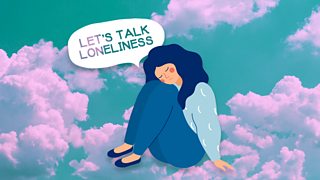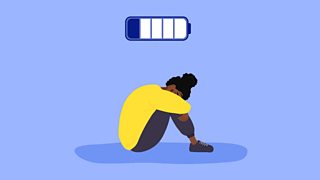‘Use that time to energise yourself, to recentre’: How solitude could help you live a happier life

When did you last spend some time alone? Did you embrace it, or were you lonely?
Research shows that we spend, on average, one-third of our waking life alone and older adults spend up to half of their waking time alone. So, what can we gain from times of solitude and how can we become better at including it in our day-to-day lives?
Professor Netta Weinstein is the co-author of Solitude: The Science and Power of Being Alone. Along with her co-writers, Heather Hansen and Thuy-vy T. Nguyen, she says that solitude has a bad reputation and that there are actually many benefits to spending time by ourselves.
Professor Weinstein joined Anita Rani on Â鶹ԼÅÄ Radio 4’s Woman’s Hour to discuss what these benefits are and to share her advice on how to harness the power of alone time...
So, what is solitude and why does it often get a bad reputation?
“We tend to confuse loneliness and solitude,” says Professor Weinstein. “We're set up to think of it as a negative thing, unless we really stop and think about how solitude can be positive in our own lives.
“The way that we talk about it is: ‘I'm a solitary person.’ ‘I'm a loner.’ We judge that others must be loners or asocial if they don't want to be with others or if they're choosing to be by themselves - maybe nobody wanted to spend Friday evening with you, or maybe you didn't want to spend Friday evening with anyone else, because there's ‘something wrong with you’.”
But Professor Weinstein argues that we should look at spending time alone as a positive thing and says that this might look different for different people.
“The type of solitude that we immediately think about is called complete or pure solitude, which is when there's nobody around. You're not talking or texting. You're not interacting. You're alone with your thoughts. Some people don't love that form of solitude, but it's something that we can do a little bit of, and then mix it with other forms of solitude.
“Maybe you’re watching TV, so you don't have to sit with your thoughts if it's not the right space for you at that moment. You're alone and there's nobody around interacting, but you're also doing activities that busy your minds.
"What I would really recommend is to find your own path to positive solitude in your life. There isn't going to be a one size fits all. For some people, that more meditative state or really reflecting and thinking works really well, but for others it might be about just finding time to relax and unwind.”
What are the potential benefits of embracing solitude?
Scientists are still learning about the benefits of solitude and some of the potential benefits have more scientific evidence than others. But Professor Weinstein says that taking time alone could help your wellbeing.
By spending time alone, you could find a stronger sense of connectedness to your ‘authentic self’.
“When we're alone, we're free from the demands and pressures of others. Naturally, people want us to respond to them when they talk. We make decisions together. We negotiate how we spend our time.
“When we're alone, we're free to be one with our own thoughts and really get to know ourselves. We are free to pursue the things that we value or enjoy, regardless of whether our friends also enjoy them.
“Solitude allows us to connect with ourselves and to have that sense of freedom of choice. So it's really building, getting to know ourselves, our own thoughts, our own feelings, and just being free to choose how we create that space for ourselves.”

Another area where she says solitude could help you live a happier life is through what she calls ‘rest, relaxation, renewal’.
“This is about feeling rested and feeling peaceful. When we think about our best social interactions, when they go really well, they're fun, they're enjoyable, we get excited to see people. We call this ‘high arousal positive emotions’. It makes us happy and energised.
“Solitude doesn’t make us feel that way. Usually, it's a much calmer space. People don't usually describe it as energised or fun, but they talk about feeling calm or peaceful.
“Solitude gives us ‘low arousal, positive effect’. It's not that we can't have that when we’re with other people. We can interact in a really calm way with others and find a peaceful moment. But being alone tends to naturally lend itself to that sense of peace and calm.
“You can use that time to energise yourself, to recentre. You can come back with more energy because you’re not depleted. That rest and peaceful time is really beneficial. Essentially, solitude can be a place for calm.”
So, how can we harness the power of being alone to reap these benefits?
Keep reading for Professor Netta Weinstein’s tips...
1. Start small
“We don’t have to jump into the deep ends of solitude,” says Professor Weinstein. “It doesn't need to be something that’s huge and requires a whole lot of changing your life around. It doesn't need to be transformative. It really can be small moments in your everyday life.
“We don’t have to say: ‘Well, I don’t feel comfortable in solitude, so I’ll go away for a week by myself and really get to know myself.’ We recommend to start small. Even 15 minutes can help us to relax and feel many of the benefits of alone time. It doesn’t have to be something that becomes a really intensive experience. Start small and get practise at it.”
2. Look at your relationship with solitude
“Solitude comes naturally for some of us, but actually it might feel uncomfortable, scary, lonely or empty for others, or for some of us at certain times. But it is something that we can get better at with practise.
“We find that people can build their relationship with solitude and practise makes perfect. So, with small periods of time alone, we can begin to get to know ourselves in solitude and get to know solitude itself. Think about incorporating those little moments in your everyday life and playing around with what the relationship with solitude could look like. It takes some practise to get comfortable with it.”
3. Reflect on what you want from solitude
“There are many ways to be alone,” says Professor Weinstein. “And there are different ways to use that time. What are the ways you can take care of yourself? What are the fun things you can do that you might otherwise not have the chance to do? Is it time that you want to be want to be peaceful or creative? Do you want to use it to really reflect on your goals?
“We hear about people who go out on these long hikes in the wilderness for weeks, and they find themselves and they transform themselves through that. Those are special moments of solitude. But actually, our everyday life solitude can also be really important for us. It could be sitting alone in your home, having some kind of self-care experience, taking the time to relax, having a bubble bath, baking a cake, or a lot of people talk about gardening as a hobby.
“Reflect on the environment you want to put yourself into. Do you want a loud space or a quiet space? Some people love to be in nature. Some people love to be at home. Some people might feel safest with others around, but not interacting with them. So going out to a cafe might be really nice.”

4. Set a plan
"Thinking through how you would like to use your solitude is really beneficial. Some people really benefit from having a plan: ‘Well, if I have 15 minutes of time alone, how do I want to use it and what do I want to do?’
"Some people simply plan to set up the environment for themselves, so they might decide that they want to be in a certain location, or they want to set up their house to be a certain way, maybe the lighting is a certain way or certain music is playing.
"Think about what steps to take to make alone time the best it can be for us in that moment. So set yourself a plan - what do you want to be doing and what is achievable within your everyday life?"
5. Be a good friend to yourself
"If our thoughts are pretty hard to us, so we're thinking in a really self-judgmental way, being critical, or we're ruminating something, then solitude is going to feel lonely and empty and difficult. So, avoid harsh comments, avoid self-judgement, avoid making hard comments to yourself.
“Think about how to be a good friend to yourself. We often think about building relationships and friendships with others, but we sometimes forget about building that relationship with ourselves. We can be our own buddy instead of being our own enemy.
“We talk about that as self-compassion and having an interest in ourselves, the way that a good friend would be compassionate to us and have an interest in us. Think about the mindset that you have and relationship that you’re building with yourself and how do you use your alone time to do that.”
6. Be curious and have fun
“The best moments of solitude are ones where people have curiosity about themselves about their environments. Maybe some creative challenge is going on, or there’s something that they want to do that they find really rewarding that helps them to take care themselves. So have fun with it, take that time to be curious.”
You can hear Professor Netta Weinstein’s full interview on Â鶹ԼÅÄ Radio 4’s Woman’s Hour on Â鶹ԼÅÄ Sounds - it's the episode from 8 April.
Join the conversation on and @bbcwomanshour.





